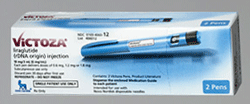 |
| Novo Nordisk's Victoza--FiercePharma file photo |
Eli Lilly is one step closer to launching its promising new diabetes drug dulaglutide--and one step closer to putting a crimp in Novo Nordisk's big-selling rival, Victoza. Lilly unveiled top-line results from a head-to-head trial between its once-weekly Type 2 diabetes remedy and the once-daily Victoza (liraglutide). And dulaglutide stood its own.
Dulaglutide didn't prove superior to Victoza, which would have been ideal for Lilly ($LLY), if not so much for Novo Nordisk ($NVO). Few expected that, anyway. But by showing itself equal to the task, and with a convenient weekly dosing schedule, dulaglutide could carve market share away from Victoza, which is one of Novo Nordisk's growth mainstays. The drug most threatened by the new data isn't Victoza, however. It's Bydureon, AstraZeneca's ($AZN) once-weekly version of exanatide, which went up against Victoza in a similar head-to-head trial, and lost.
All three drugs are GLP-1 agonists, and work by stimulating insulin production. Till now, Victoza has dominated the category, with about two-thirds share, according to Mark Schoenebaum, an analyst at ISI Group. Schoenebaum estimates the total market for that class at about $3 billion at present, and $4 billion to $5 billion in a few years.
Diabetes is a huge and--unfortunately for public health--fast-growing market. But diabetes drugmakers want to grow faster than the market, and that means building and protecting share. Schoenebaum figures that dulaglutide's once-weekly dosing could help it conquer about one-third of the market, which would leave Victoza fighting off AstraZeneca's Byetta and Bydureon to hang onto as much of its share as possible.
At that rate, dulaglutide could be a $2 billion drug, give or take half a billion, Schoenebaum says. John Boris, an analyst at Suntrust Robinson Humphrey, told Reuters that he believes Lilly can offer dulaglutide at a discount to Victoza, gaining ground with payers. He raised his estimates to $1.6 billion from $1.1 billion. Schoenebaum put his range at $1.6 billion to $2.5 billion. "Where could we be wrong?" he asked in an investor note. "(1) Competitors freak doctors out about the possible increased blood pressure signal for dula or (2) tolerability is significantly worse than Victoza."
Schoenebaum is referring to a potential risk of high blood pressure for dulaglutide users. Earlier trials flagged the possibility, and until the full AWARD-6 results are forthcoming, we won't know whether the latest data confirms that. And tolerability will frankly be an open question till after dulaglutide hits the market, because unexpected side effects can crop up outside the controlled environment of clinical trials.
Uncertainty is something Novo Nordisk can use to its advantage. With chronic disease, patients and doctors tend to stick with a drug if it's working. Victoza patients who reliably follow the dosing schedule--and whose blood sugar is already controlled--aren't likely to switch in large numbers. The same could be said for Byetta and Bydureon users.
So, Lilly's best opportunity, at least at first, is likely to be new patients, and, potentially, Bydureon users who want to stay on a weekly drug but believe dulaglutide could work better for them. Plus any Victoza and Byetta patients who tend to forget their meds, or aren't getting the results they want from those treatments. With a big patent-cliff sales gap to fill, Lilly will be firing on all cylinders to build dulaglutide sales.
Already, Novo Nordisk is leaning on Victoza's established place in the diabetes-fighting arsenal. The drug "has a proven track record of effectively helping patients with Type 2 diabetes control their A1c daily in the United States since its approval from the FDA in 2010," the company said in an emailed statement after the new data were released, adding that it can't comment further till after the full study appears.
Bydureon and Byetta are the two drugs AstraZeneca and Bristol-Myers Squibb ($BMY) acquired along with Amylin Pharmaceuticals ($AMLN) in 2012. Since then, AstraZeneca bought Bristol-Myers' share of their diabetes partnership. So AstraZeneca will be driving those brands if and when dulaglutide wins approval, which Lilly expects this year.
During AZ's third-quarter earnings call, CEO Pascal Soriot pointed to a surge in Bydureon sales in January, with a "stabilization" in Byetta sales during the latter part of 2013. For the full year, the two drugs managed to bring in $357 million for the company.
The growth early this year could point to another vulnerability for Victoza: The pharmacy benefits manager Express Scripts ($ESRX) knocked it off its national formulary in favor of Byetta and Bydureon. That shows AstraZeneca is willing to compete on price, too. We'll see how Novo Nordisk handles its own pricing as the year goes on.
- see the Lilly release
- get the Reuters news
Special Reports: 10 Top-selling Diabetes Drugs of 2012 | Top 15 Drug Launch Superstars - Victoza